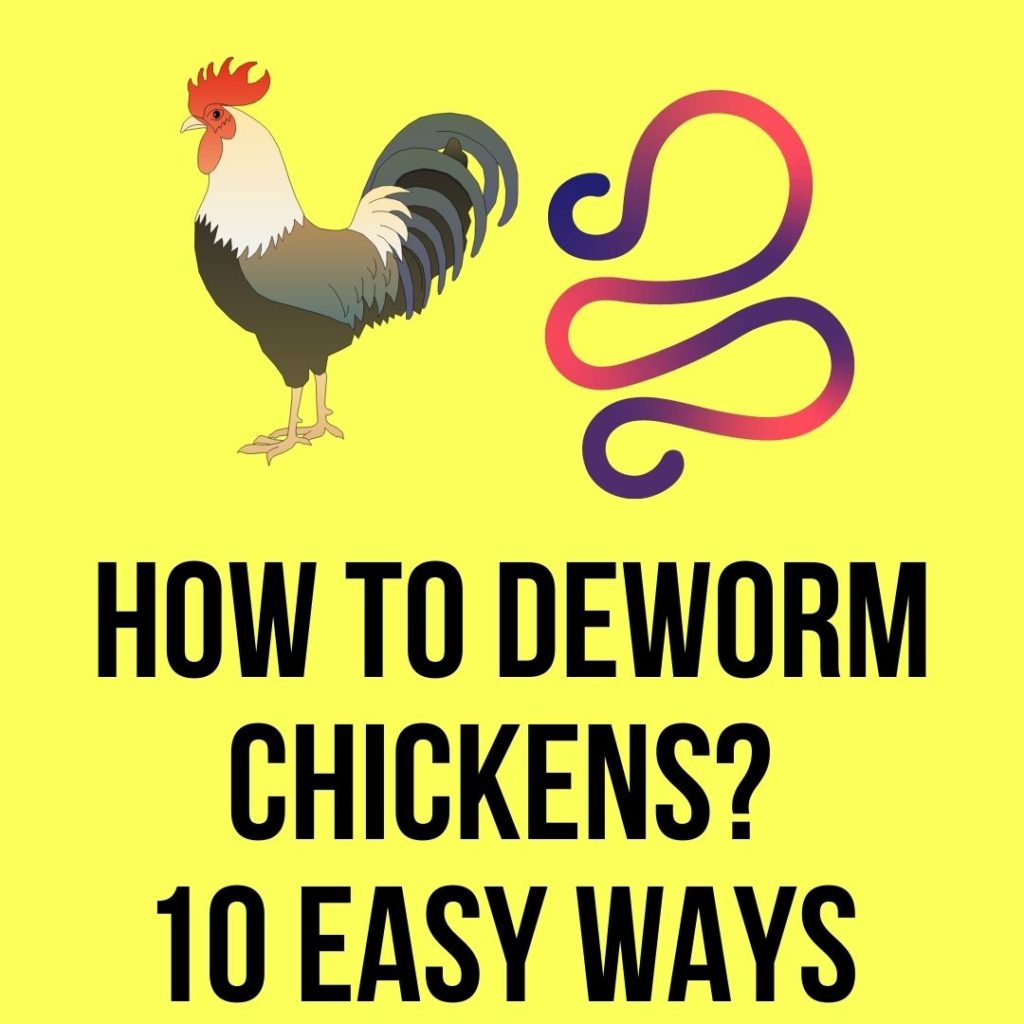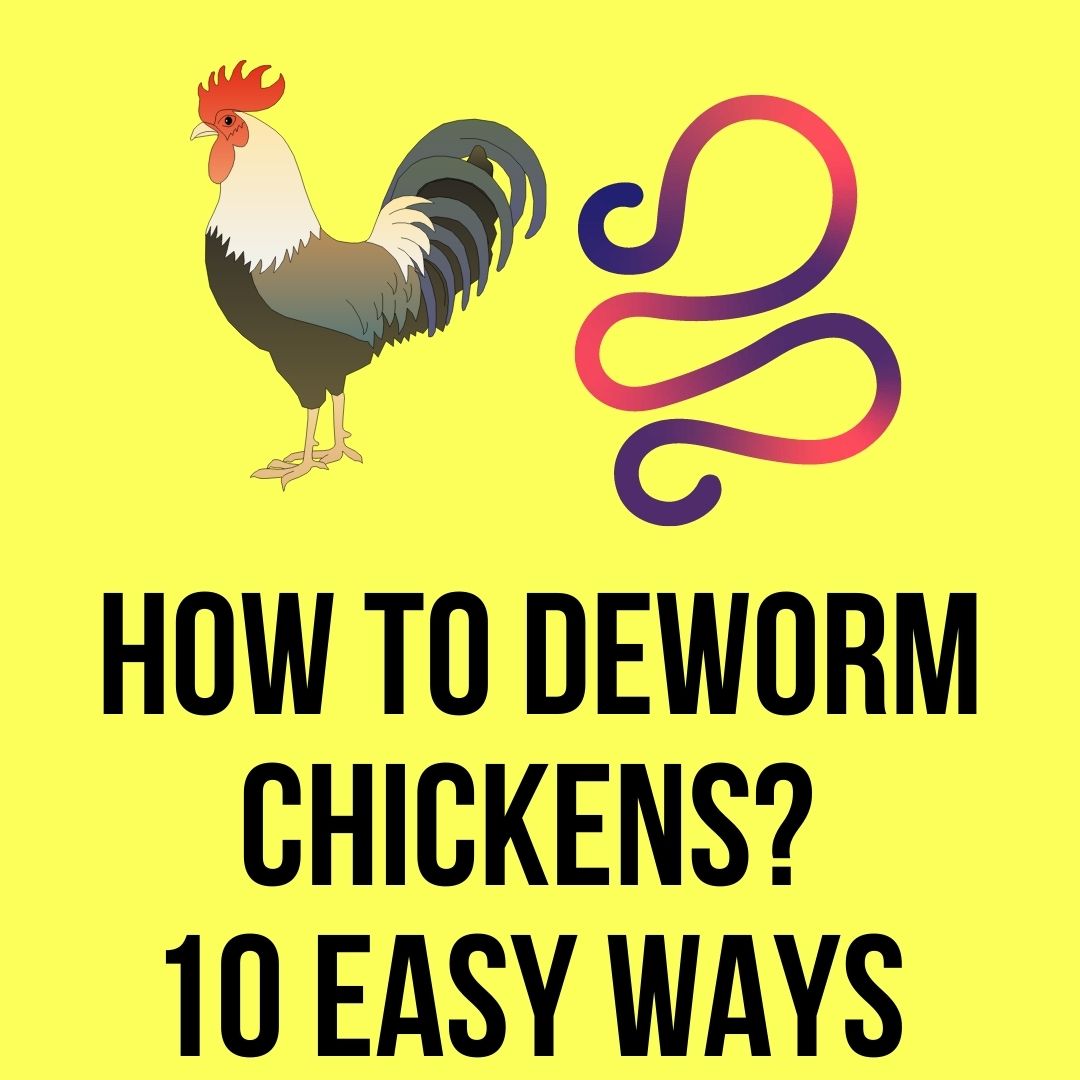Are you a Chicken Keeper? Wondering whether and when should you Deworm your Chickens? Well, we understand that the thought of Worms in Chicken is undoubtedly unsettling and must have grossed you out. However, since you have discovered that your Chicken has worms, it is time to focus on treating them.
Chickens are a great addition to the homestead; however, caring for them isn’t as simple as it seems. These fun and interesting creatures, though, are generally easy to keep, but healthy and thoughtful caregiving is necessary. And one of the major requirements is Chicken Deworming.
Contents
- Do chickens need deworming?
- When to start worming chickens?
- What to do if the Chicken has worms?
- How to deworm Chickens Naturally?
- Common Types of Worms in Chicken
- 10 Easy ways to Deworm Chickens (Naturally and Medically)
- Medicinal Deworming Drugs
- Natural/Organic Ways of Deworming Chickens
- Best Chicken Wormer for Water
- Is garlic good for chickens?
- Benefits of Garlic for Chicken:
- Worm Prevention in Chickens- Dos and Don’ts
- Why is my chicken poop watery?
- Wrapping up…
Do chickens need deworming?
Chickens and other poultry suffer from various conditions, and unfortunately, worms are part and parcel of having them. Since they often eat from the ground, picking up worms is extremely common for them.
Maybe while they are feeding on their common feed, they accidentally or purposely picked worm or worm eggs. This later makes them develop worms inside their system.
Deworming in Chickens isn’t difficult, but it at some stage becomes necessary. Most Chickens usually have some worms in their system.
A few of them are never a problem; however, it becomes a problem when chickens develop a lot of worms in their system.
This condition can lead to several health issues, slower growth, decreased laying, and sometimes even death. That is why to discourage any such condition, deworming in Chickens is extremely necessary.

When to start worming chickens?
Deworming is the best and most effective method of keeping Chickens safe from any kind of worm infection.
One must start deworming their chickens and other flocks from the age of 4 to 6 months. Besides that, deworming twice a year, especially during the spring/summer season, is advisable.
Some expert Chicken keepers also consider deworming their flock every 3 months, which is 4 times a year, for extended safety.
What to do if the Chicken has worms?
Keeping pets isn’t a very easy job. Be it dogs, cats, birds, or Chickens, it needs extreme care and attention to have these flocks easily around. The moment you suspect your Chicken for worms, start noticing symptoms.
Some of the common symptoms of worms in Chickens one must look for include,
- Diarrhoea,
- Weight loss,
- Head-Shaking,
- Abnormal-foamy-looking droppings,
- Dirty vent feathers,
- Listlessness,
- Gasping,
- and Decreased egg production.
Upon noticing any such symptoms, it is essential to consult a vet first before going for self-deworming.
The Veterinarian will diagnose the Chicken poop or other samples to determine whether it is a worm infection or not.
The diagnosis process will also determine what kind of worm infection it is and whether the count is light, medium, or heavy.
How to deworm Chickens Naturally?
What kills worms in Chickens? Deworming Chickens isn’t as tricky as it appears.
All it takes is an effective deworming drug and a regular course to help with the problem.
However, before discussing the common deworming methods in Chicken, it is important to learn about the types of worms that these house birds suffer from.
Common Types of Worms in Chicken
- Roundworms (Long, white and yellow in appearance).
- Tapeworms (Long, white and flat)
- Gapeworms (Red forked worms)
- Capillary worms (Hair like worms)
- Cecal worm (Small worms)
10 Easy ways to Deworm Chickens (Naturally and Medically)
With Medicinal drugs and Natural Remedies, you can easily deworm your chickens.
Here are some of the best and easiest Chicken deworming methods that you might like to follow.
Medicinal Deworming Drugs
- Vermex Eco
Vermex Eco, though, is specially formulated for fighting cocks, but it is also effective in all types of free-range Chicken. The drug show results in eliminating typical Chicken worms, including roundworms (Ascaris), hairworms (Capillaria spp.), and tapeworms.
- Fenbendazole
Fenbendazole is another deworming drug that effectively eliminates tapeworms, gapeworms, roundworms, capillary worms, cecal worms, and flukes. Individuals can feed it to Chickens by making a paste or by mixing it with their drinking water.
- Albendazole
Albendazole is another oral Chicken dewormer that is commonly used across the globe. It is known for its effectiveness against tapeworms, cecal worms, roundworms, capillary worms, cecal worms etc. However, usage of the same for Pigeons and doves isn’t recommended since it may prove toxic to them.
- Pyrantel Pamoate
Pyrantel Pamoate is a non-FDA-approved deworming drug for Chickens. It is known for its effectiveness against roundworms, capillary worms, and cecal worms. For giving it, either mix it with drinking water or prepare a paste and mix it with Chicken food. You may find Pyrantel Pamoate under different names, including Drontal, Virbantel, Avio-Coxiworm, and Mediworm.
- Piperazine
Commonly sold as Wazine, Piperazine is known for its effectiveness against Roundworms in Chickens and other meat and egg-producing birds. It is also the only FDA-approved treatment for internal parasites in birds.
Natural/Organic Ways of Deworming Chickens
- Papaya Leaves
According to the research conducted by the University of the Philippines, finely chopped papaya leaves combined with the feeds for 3 days can eliminate worms from a Chicken’s system.
- Onions and Garlic
Fresh Onion and Garlic, or the ones in dried form, both are effective in eliminating worms from Chicken’s system.
For best results, mix 1 or two cloves with whatever (Onion or Garlic) you use. Follow the pattern for 10 days to see results.
- Pumpkin seeds
Similar to dogs and cats, Pumpkin seeds are also known for eliminating worms from Chickens. All you need to do is, throw some plain, un-salted pumpkin seeds in your backyard and let the chickens enjoy.
- Cucumbers or Cucumber seeds
Cucumber seeds are one the excellent organic and natural dewormers for chickens. However, since getting the seeds out can prove time taking, it is ideal for tossing some cucumber slices with your Chicken’s food in the yard.
- Ipil-Ipil leaves
Ipil-Ipil leaves are known as anti-nematicidallhelmintic and are proven for their effects against roundworms. Feed some fresh young leaves of Ipil-Ipil every day before their food. You may start noticing effective results very soon.
Deworming schedule in poultry
| Age | Seasons (To consider/ To Avoid) | |
| 4 to 6 Weeks | First time | Avoid Winter and Fall Molt |
| 8 Weeks | Repeated Dose | |
| Breeders | Before Onset of Breeding and Laying Period |
Best Chicken Wormer for Water
Here is the list of best Chicken wormers for water.
- Verm-x Liquid Poultry & Fowl Internal Parasite 250ml
This is a naturally driven formula ideal for mixing with Chicken water.
It is meant for use with flocks of all ages and is gentle on appetite and digestive system as well.
- Vetrx Poultry Aid, 2 fl. oz
This one is an oil formula that helps chickens naturally fight off worm infestations.
It also keeps respiratory illness at bay and enhances their immune system.
- 100 natural
- Effective relief and prevention from respiratory diseases
- Fights against colds roup scaly legs amp eye worm
- For all standard and rare poultry chickens turkeys Bantams Ducks geese and game birds
- 2 fl oz
- Backyard Chicken OXY E100, 30 Milliliters
It helps in providing chickens relief from eyeworms, roundworms, and tapeworms.
- 30 milliliters of Backyard Chicken OXY E-100 water treatment drops
- Safe and easy to use liquid sanitizer designed for the control of micro organisms in water
- Reduces your flock's exposure to pathogens
- One bottle treats 90 gallons of water
- Made in the USA
Is garlic good for chickens?
Yes, Chicken Keepers and experts suggest that garlic is an excellent herb/ food item for Chickens.
Some of its multiple benefits include enhancing respiratory health, providing relief from infections, eliminating worms, and aiding in building strong immunity.
While you are just trying garlic with your Chickens, always go slow. Begin with a small quantity first and notice for any reaction. If the Chicken is taking it easy on digestion, you can gradually increase the quantity.
Also, keep the quantity low since garlic has a very strong smell and flavor, and chickens may not happily have them in the first place. Thus, consider using a very small amount that too by mixing it with some food items.
Benefits of Garlic for Chicken:
- It provides protection against worms and bacteria (Salmonellosis, Colibacillosis, and Cholera).
- It helps in boosting the immune system.
- It helps in regulating egg production.
- It helps chickens who are underweight or are refusing to eat for long.
- It deters red mites.
- It acts as a replacement for synthetic antibiotics.
- It rebalances the system after illness.
Worm Prevention in Chickens- Dos and Don’ts
- Maintain a clean and healthy diet for the Chickens.
- Do keep their feeders clean.
- Do provide them with fresh, clean, and clear water to drink.
- Keep their farm/ space clean from litter and poop.
- Do keep in touch with your poultry agent for expert advice.
- Do not provide food on the grounds that are already accumulated with dirt, dust, and debris.
- Avoid overcrowding chickens on the farm.
- Do not overlook any signs and symptoms of illness.
- Do not avoid regular deworming requirements.
Why is my chicken poop watery?
Chickens, though, generally have a healthy semi-solid poop, but if it is otherwise, it is a matter of concern.
Watery Poop in Chickens is usually a sign of diarrhoea. During the hot and humid season, when chickens/ hens tend to drink a lot of water, they may develop diarrhoea in them.
However, watery poop or Diarrhoea in Chickens isn’t incurable. All you need to do is, provide fresh and clean water to your chickens. Ensure that during high heat and bright sun, chickens have enough shade to rest.
Also, try to keep flies and mosquitoes to a minimum as they might cause common infections leading to watery poop in chickens.
6 Chicken Breeds Having Black Meat, Skin, and Bones
8 Tips For Keeping Chickens Safely In-Home and Coops
How To Heat A Chicken Coop Without Electricity?
Wrapping up…
Sometimes worm prevention amongst Chickens isn’t possible, but the treatment for the same isn’t out of reach.
The best way to stop worms from taking hold of your Chicken is to maintain cleanliness and hygiene.
However, following that, regular deworming and Vet consultations are something that aids in the better health of your flocks.
Chickens count on their owners for the best care, and Chicken dewormer is an important part of that care. We hope you have found valuable information by now.



